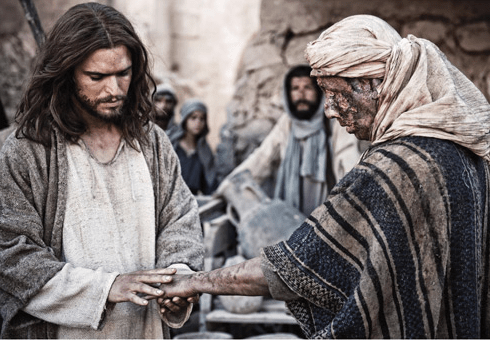If asked “What is your favorite Jesus story?” how might you respond? Since Jesus is the visible expression of the invisible God (Colossians 1:15), what narrative about Jesus best displays the character of God for you?
Our small group is working its way through the Gospel of Luke. This past week we were in chapter five where I was quickly reminded of one of my all-time favorite stories – Jesus’ healing of a leper.

While Jesus was in one of the towns, a man came along who was covered with leprosy. When he saw Jesus, he fell with his face to the ground and begged him, “Lord, if you are willing, you can make me clean.” Jesus reached out his hand and touched the man. “I am willing,” he said. “Be clean!” And immediately the leprosy left him. (Luke 5:12-13)
Biblical and other historical accounts attest to a prevalence of leprosy in first century Palestine. Today, we have a better understanding of the disease than they did 2000 years ago. Leprosy (Hansen’s Disease) is a chronic infectious disease caused by a slow-growing bacteria that gravitates to the peripheral nerves and the cooler parts of the body. The skin, being one of the coolest regions of the body, is affected first and most significantly by leprosy. Thus, in ancient Palestine, leprosy was often referred to as a skin disease.
When the 2 million or so Israelites camped in the wilderness after their exodus from Egypt, protection from infections was paramount. Pretty much what we are experiencing in the our present day pandemic. For the protection of the entire society, God gave pretty strict mandates to keep the community safe:
As for the person who has the leprous infection, his clothes shall be torn and the hair of his head shall be uncovered, and he shall cover his mouth and call out, “Unclean! Unclean!” He shall remain unclean all the days during which he has the infection; he is unclean. He shall live alone; he shall live outside the camp. (Leviticus 13:45-46)
As the people camped in the wilderness together, social distancing was necessary as long as the person was infected. Fast forward a couple thousand years and the social distancing had turned into social ostracism. Jesus’ later encounter with a group of lepers indicate that they knew their place in public as they “stood at a distance” from him. The societal requirement for lepers was to stand 50 paces (about 125 feet) from healthy people.
So when the man in the Luke story approached Jesus, he broke through the social boundaries that had been established for him. He knew Jesus could make him clean again, making a way for him to reenter society. Lord, if you are willing, you can make me clean. What he likely didn’t know was how Jesus might respond. Rebuke was certainly a possibility. He was unclean and Jesus was a rabbi. In their culture, rabbis preferred to stay far away from the unclean. And legally, the man was required to maintain 50 paces from Jesus.
But he took the risk and approached Jesus. He broke both law and social custom on the chance that Jesus might heal him. Jesus’ response was two-fold. First, and I think foremost, he touched the man. Jesus touched him! How long had it been since the man had been touched by a healthy person? (Something we can certainly understand this during a pandemic!) And yet, Jesus made it a point to touch the man first, neglecting to comment on the man’s impropriety. Then he said “I am willing, Be clean!
In this story we experience what Eugene Peterson often referred to as “the great reversal” in The Message paraphrase of the New Testament (cf. Matt. 19:28, Mark 10:19, Luke 13:28). Jesus turned everyone’s expectations upside down – the man, his disciples, and the onlookers. Jim Edwards, in his commentary on the Gospel of Luke, suggested that a reverse contagion had taken place: rather than Jesus being polluted by the leper, the leper is cleansed by Jesus.
The radical, compassionate Jesus trumped tradition in favor of care of the outsider, of touching the untouchable. This is what makes Jesus worth following. And this is what makes our following worthwhile.
(A postscript: Rereading this post, it occurred to me that some may take this story as a reason not to adhere to local mask mandates during the pandemic. That would be missing the intent of Jesus’ actions and missing the character of Jesus. As previously discussed, we dare not let our presumptive religious and political ideologies inform our understanding of who Jesus is (see What the Right and Left Have in Common). We must always allow Jesus to inform our ideologies. Another reversal.)

Thanks Curt! This is a campaigner lesson we were just talking through:) I will use it!!!
LikeLike
I love being reminded of how personal Jesus is because I too easily forget it. The doubting part of me often questions if I’m asking Jesus to be too intimate in my life. As the apostle Paul would say…by no means! It is Christ’s joy to show up for me, and my freedom by grace to meet Him as an utter mess. Thanks for this, Curt! I hope all is well with you and your family.
LikeLike
Thanks, Zach. Yes, we all need reminders once in a while. We are doing well. Hope you and Katelyn are doing well, also. How are you liking Des Moines?
LikeLike